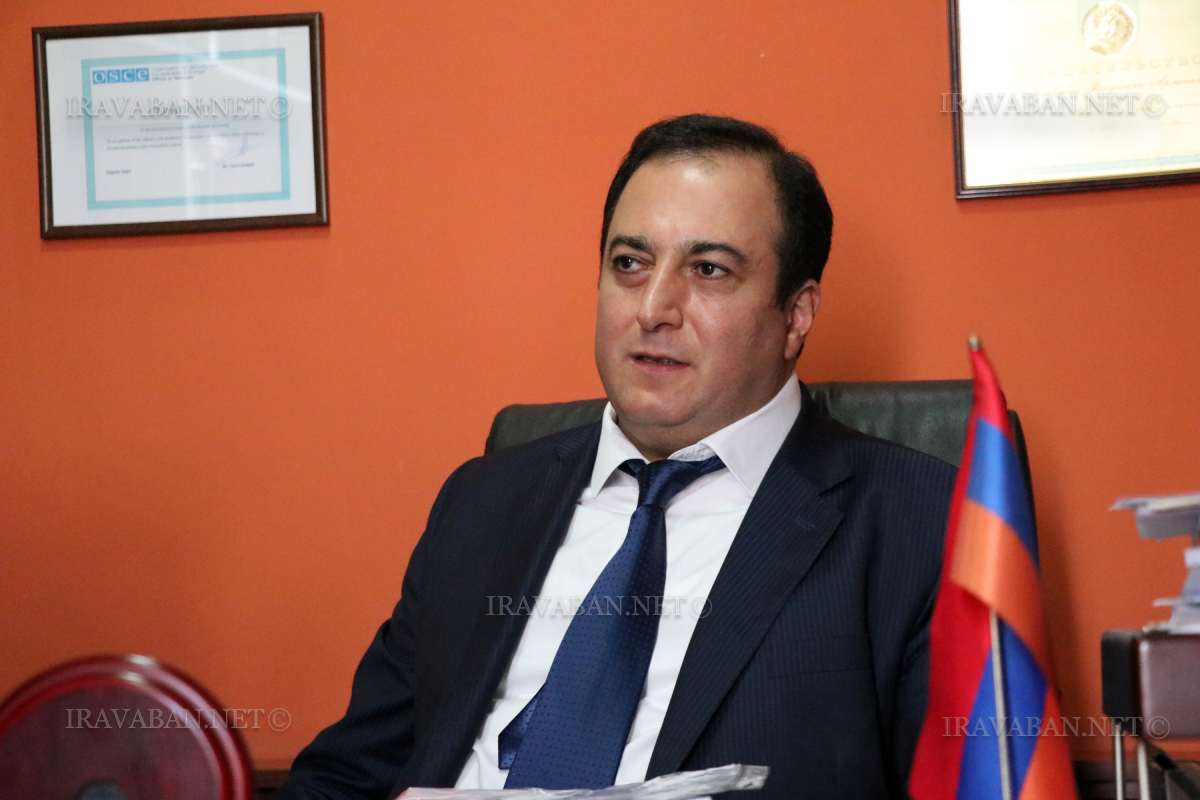The issue of institutional legislative regulation of the expert sphere seems to have been overlooked, which is felt in practice. This is the opinion of Vahe Yengibaryan, the only Doctor of Juridical Science (SJD) in the field of criminology, Professor of the Chair of Criminal Procedure and Criminology of YSU.
Since 2001, Yengibaryan has been teaching at YSU Faculty of Law, RA Academies of Justice and Advocacy, Police Educational Complex, as well as a number of other law universities. At the same time, he is the Executive Director of the Association of Judges of the RA, the Editor-in-Chief of the “Judicial Power” scientific methodical magazine, authored more than 200 scientific works, including 8 monographs, one university textbook.
He has been awarded more than a dozen departmental medals and numerous awards, has been an international expert of the Council of Europe for more than 15 years, and also is a member of Armenian investigative bodies and expert qualification commissions.
Within the framework of the “Legal Scholars” series, we talked with Vahe Yengibaryan about the changes in the new Criminal Procedure Code, the new crimes in the Criminal Code and the problems of the expert community in the RA.
Notably, the new Criminal and Criminal Procedure Codes came into force on 1 July, 2022.
– Mr. Yengibaryan, the new Criminal Procedure Code stipulates that “telephone numbers of those communicating through the fixed or mobile phone network, personal data of the subscriber of the phone number can be requested by the decision of the investigator approved by the supervising prosecutor.” Can this not be considered a violation of the right to privacy of communication? Can the issue become a subject of constitutional justice?
– Here we are dealing with a question from the issues of criminal proceedings: that is, balancing public and private interests. In any legal regulation, it is necessary to find the reasonable and rational grain, which will allow balancing public and private interests. For example, a procedure for their judicial sanction has been established for secret investigative actions. In other words, the secret investigative operation, which implies an interference with the person’s conventional and constitutional rights, cannot be carried out without the permission of the court, which is a serious guarantee of legality.
In this case, we are dealing with prosecutorial control; the investigator does not make a decision independently in this case. Moreover, that decision can be appealed to the superior prosecutor in a general manner, as well as disputed in a court.
However, here the investigator will request personal data, not directly interfering with their personal life, these are different understandings. Moreover, it should not be excluded that receiving such data in the context of the examination can play a favorable role for the person about whom the data is requested.
– According to the new Criminal Procedure Code, changes were also made in the field of conducting examinations.
-The conceptual approach has changed in general. If under the previous legislation, appointing and performing an expert examination, among others, was intended as a separate investigative action, now, under the current legislation it is intended as a separate evidentiary action with all the legal consequences arising from it.
One of the important changes is also the abandonment of the institution of the specialist, or at least that concept. Previously, we had to have a specialist who had sufficient professional knowledge and was involved in a proceeding to assist the body conducting the proceeding, and an expert was a person with special knowledge who performed an examination. The new legislation has adopted the model of European countries, which uses only the collective concept of expert, considering the possibility of both performing expertise using special knowledge and providing support for procedural actions using skills.
Another important change that was made in this context was the elimination of the previously existing exhaustive list of fields of application of special knowledge. Previously, expertise could be performed in 4 fields: science, technology, craft, and art. Currently, the phrase “other fields” has also been added to the wording, which is not at all due to the unprecedented rate of development of the IT field in the 21st century, the diversification of various modern scientific directions, and other circumstances. For example, sports did not fit into any of those 4 fields. It turns out that if there was a need for an examination in the field of sports; then the legislation did not provide for it. This problem is solved.
Among the expert’s conclusion, expert’s opinion and expert’s testimony are already considered as separate types of evidence. Previously, the legislation provided for the possibility of questioning the expert, but the expert’s testimony was not considered a separate type of evidence.
At the same time, in addition to the expert’s conclusion, the expert’s opinion is provided as separate evidence. In general, this provides an opportunity for the private participant in the proceedings to use the principle of competition. The expert’s opinion cannot be presented by the body conducting the proceedings, it can be presented only by the private participant of the proceedings, and moreover, it is given by the expert without studying the materials of the case.
– Mr. Yengibaryan, how do you evaluate the results of the implementation of criminal justice in Armenia?
– I do not want to give a general assessment, but I want to talk about expert structures, whose work can both undermine and also raise the efficiency factor of criminal justice in the RA to an unprecedentedly high level.
The issue of institutional legislative regulation of the sector seems to have been overlooked, which makes itself felt in practice. We know that in many cases, the reasonableness of the terms of criminal proceedings is not respected, because the expert opinions are delayed, and that is not a good day. As early as since 2006, packages of legislative projects regulating the expert sphere were being developed, and in 2007, a concept on the legal regulation and prospective development of expert activity was adopted. To date, we do not have a “mother” law that will comprehensively regulate expert activity.
In addition, if we want to encourage the expert community, we need to create social and legal guarantees for their activities. Today, such guarantees are regulated by internal legal acts of institutions.
I believe we should have a body where experts can be accredited and able to -act as independent experts outside expert institutions. Such an approach will make it possible to significantly shorten the period of execution of examinations, taking into account the currently overloaded work of some areas of expert institutions.
We should also try to train forensic personnel who will support the investigation and will be specialized in the field of digital technologies. In the future, paper will gradually give way to digital metadata. In this regard, we may face serious challenges, because the world is going to digitalization and we must not lag behind that process.
– The investigative phase was also abolished with the Criminal Procedure Code. What will this change do?
– This was one of the conceptual changes. Along with that, the stage of deciding the issue of initiating a criminal case was also abolished. Previously, verification actions were carried out, then it was decided whether to initiate a criminal case or not, after which an investigation or a preliminary investigation could be carried out. Moreover, after the expiration of the 10-day period or during that time, the investigation could be followed by the preliminary investigation.
We no longer have an investigative body in the chain. It begins and ends parallel to the preliminary investigation. Previously, one had to end and the other began. In formal terms, the change is quite a step forward. Time will show its effectiveness.
There are risky institutions in the Code, whose implementation still needs to be tested in practice. For example, cooperation proceedings, deposition of testimony, institutes of initiating criminal proceedings. However, in general, it can be said that the new Criminal Procedure Code is more advanced.
 – One of the directions of the judicial reform strategy was the elimination of the criminal subculture, within the framework of which on 22 February, 2020, the Law on “Thieves in Law” entered into force. How do you assess the work done in this direction over the past 2 years, are there legislative gaps in the law?
– One of the directions of the judicial reform strategy was the elimination of the criminal subculture, within the framework of which on 22 February, 2020, the Law on “Thieves in Law” entered into force. How do you assess the work done in this direction over the past 2 years, are there legislative gaps in the law?
– I will refrain from commenting on the criminal law profile of the criminal cases regarding the criminal subculture or the persons carrying this subculture. During the examination of such cases, we have a rather difficult situation. Here, in the person in the dock, unlike other criminal characters, is a faithful bearer of certain traditions and customs, a participant in a certain marginal environment. This is a factor creating resistance for the exam. For example, testifying is an unacceptable phenomenon for them. The task of the prosecuting body is to obtain factual data as a result of other investigative actions, which may not be required as a result of the investigation of other types of cases.
The latest press releases indicate that there is a positive shift in the progress of investigation of similar cases.
The adoption of such a law is a serious step for the legal and security environment of the state. Persons with a criminal subculture are often also involved in organized crime. I think that this issue should have been addressed earlier.
– Illicit enrichment as a crime has existed in the Criminal Code of Armenia since 2017, but until today there is no verdict passed by the court. The law enforcement bodies have charged a number of officials with this article, but the investigation of the cases is not progressing. You have been teaching at the Academy of Justice since 2004. What do you think is the reason? Lack of experience or the political will of investigators to work with this criminal group.
– The trainings are regular and are conducted; I do not think that their lack is acutely felt. In general, if we balance the intensity of the implementation of changes and the assimilation of our contingent, there is an imbalance here. Technically, physically, materially, it is not possible to do all of that at the same time and in full volume.
We have had quite serious legislative obstacles, changes are constantly being made. In practice, the bodies implementing the proceedings find niches, which are closed one by one. It is necessary to summarize the practice, select the conceptual issues and make legislative changes.















